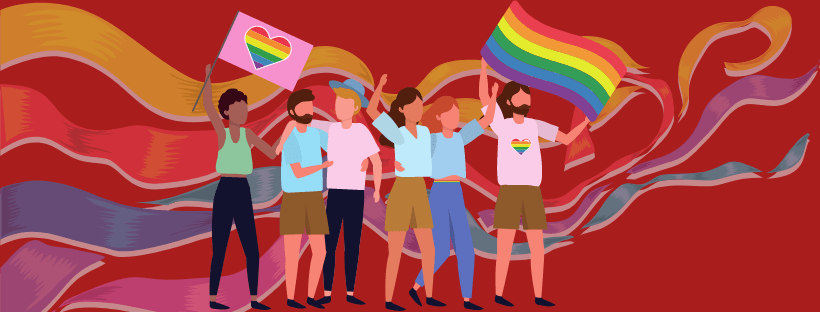By Zachary Fortin
The spread of COVID-19 around the globe has drastically altered all of our lives. It has redefined “normalcy,” regardless of how different our definitions and realities may have been. Unfortunately, it has also significantly exacerbated deeply embedded systems of inequality and oppression.
Members of marginalized communities including (but not limited to) LGBTQ2IA+, women, Black, Indigenous, Asian, Arab, Latinx and other racialized folxs, have thus disproportionately experienced the violence of this pandemic. While not exclusive to the LGBTQ2IA+ community, gender-based violence has had a notable impact on this segment of the population in the context of COVID-19. Further, intersections of various identities results in a heterogeneous distribution of this violence.
Gender-Based Violence (GBV) may be understood as the use and abuse of power and control over another person and is perpetrated against someone based on their gender identity, gender expression or perceived gender. GBV may be (but is not limited to being) physically, psychologically, sexually, emotionally, or economically violent in nature.
An intersectional approach to understanding GBV is critical. It is a fact that some people face greater risk of experiencing violence in its various forms, including women, BIPOC, and LGBTQ2IA+ peoples. The cause of such disproportionate levels of violence is a virulent cocktail of sexism founded in patriarchy, homophobia, transphobia, biphobia, racism, colonialism, white supremacy, cisnormativity and heteronormativity. Subsequently, individuals whose identities comprise two or more of these identity markers face greater risk of violence than an individual with just one. In other words, an Indigenous woman, or a transgender, black woman, faces greater risk of violence when compared to a cisgender white woman, as their identity “crosses” all three of the aforementioned identity markers. While these inequalities are currently a societal fact, the objective of any intersectional approach must not be a comparative one. Nobody wins in an Olympics of oppression. Instead, intersectionality should be used to highlight, rectify and undo the systems of oppression that permit such inequalities to permeate.
These societal patterns are exacerbated in certain contexts, as crises are powerful catalysts for all forms of violence, including GBV. Consequences of societal changes put into place to curb the spread of COVID-19 can easily augment the strain of already tenuous situations. Changes such as social or physical isolation, employment disruption, financial insecurity and fear of illness, are all associated with increases of GBV, especially in domestic situations. COVID-19 has also seen the disruption of significant services including shelters, hotlines, community support centers and programming, emergency rooms and overall access to health care. These barriers heighten the risk and prevalence of GBV as options for recipients of violence are seriously limited.
In the specific context of LGBTQ2IA+ peoples, there is no exception. Members of this community have disproportionately been affected by lay-offs and reduced hours compared to Canada’s national averages. A recent study found that 53 per cent of LGBTQ2IA+ respondents have reported stated reported disruptions in their employment due to COVID-19 compared with 39 per cent of non-LGBTQ2IA+ respondents. In addition, LGBTQ2IA+ peoples are already disproportionately represented in the ranks of people experiencing poverty and homelessness. The economic uncertainty created by the COVID-19 pandemic can only mean the augmentation of financial barriers faced by members of our community and the anxieties that accompany them.
Furthermore, there exists a distinct connection between the lack of legal gender recognition and access to various goods and services, most notably healthcare. Trans and gender non-conforming community members in particular, face potential violence and discrimination when seeking health care providers. Finding professionals that will respect and affirm their identities in addition to being knowledgeable in specific forms of care (especially for trans individuals) are very serious barriers that have only increased with the COVID-19 pandemic. The anxieties and fear typically felt by our fellow community members concerning how to pay next month’s rent or whether or not a clinic will refuse treatment are exponentially heightened and compounded with the fear of COVID-19 exposure and transmission.
With regards to the disruption of services, LGBTQ2IA+ peoples must also contend with specific challenges. A global study conducted by the United Nations Independent Expert on protection against violence and discrimination based on Sexual Orientation and Gender Identity (IE SOGI) concluded that 23 per cent of participants living with HIV had lost access to services and care providers during the pandemic. While not unique to the LGBTQ2IA+ community, the issues of HIV/AIDS are of particular importance to us. Access to such services is very much a matter of life and death for our community.
Our community also faces violence of all kinds in familial contexts. Living with family members who deny LGBTQ2IA+ identities has detrimental and destructive effects on such individuals. For LGBTQ2IA+ youth in these situations, the risk is even greater, as parents and family members very often act as gatekeepers that can prevent access to various social services, support networks, food and even money. Social isolation measures and financial insecurity in the world of COVID-19 has increased the prevalence and risk of such violence. In fact, general strategies to curb the spread of infections in general expose marginalized individuals to new and intensified forms of exploitation. The practice of “forced outing” is especially prevalent. At its core, a source of blackmail, an example of “forced outing” could resemble a landlord illegally evicting tenants under threat of having their identities divulged to friends, family or even co-workers. For members of our community with intersecting identities, this practice can have especially destructive effects; for example, migrants, or sex workers.
Our community has even been blamed for the existence of the COVID-19 pandemic. Religious and political leaders have issued statements to this effect from at least 12 European countries including Ukraine and Georgia; also from Turkey, Iraq, Ghana, Liberia, Zimbabwe and the United States. For at least the second time in only 40 years, the existence of a global health concern has been laid at the feet of the LGBTQ2IA+ community. The emergence of the HIV/AIDS epidemic was shockingly similar in this regard. It was years before this disease was understood to not be discriminatory, however the stigma even still wears on. Exactly like COVID-19, HIV/AIDS can affect any and all of us.
Despite such turbulence and violence, our community remains resilient. The impact of social media in such times should not be overlooked. It has provided information, support networks, advice, and inspiration for youth and older members of the community alike. It is imperative that we come together and stand in solidarity with those facing similar forms of violence. We must also demand support from our white and heterosexual, cisgender allies to help see us through such difficult times. Our community has survived many a plague in our past and the lessons of those experiences are more valuable now than ever.
We are stronger together.

Zachary Fortin is a human rights educator and member of the 2LGBTQIA+ community, who resides on Treaty One Territory.
Today, an action you can take to eliminate gender-based violence is to donate time, money or resources that are needed to some local organizations working to support our community members. Consider reaching out and supporting places like Sunshine House, Two-Spirited People of Manitoba, Klinic Community Health, Women’s Health Clinic, Reaching Out Winnipeg, Spence Neighbourhood Association, Rainbow Resource Center, SERC MB.

